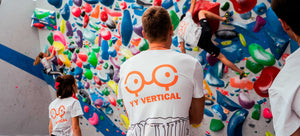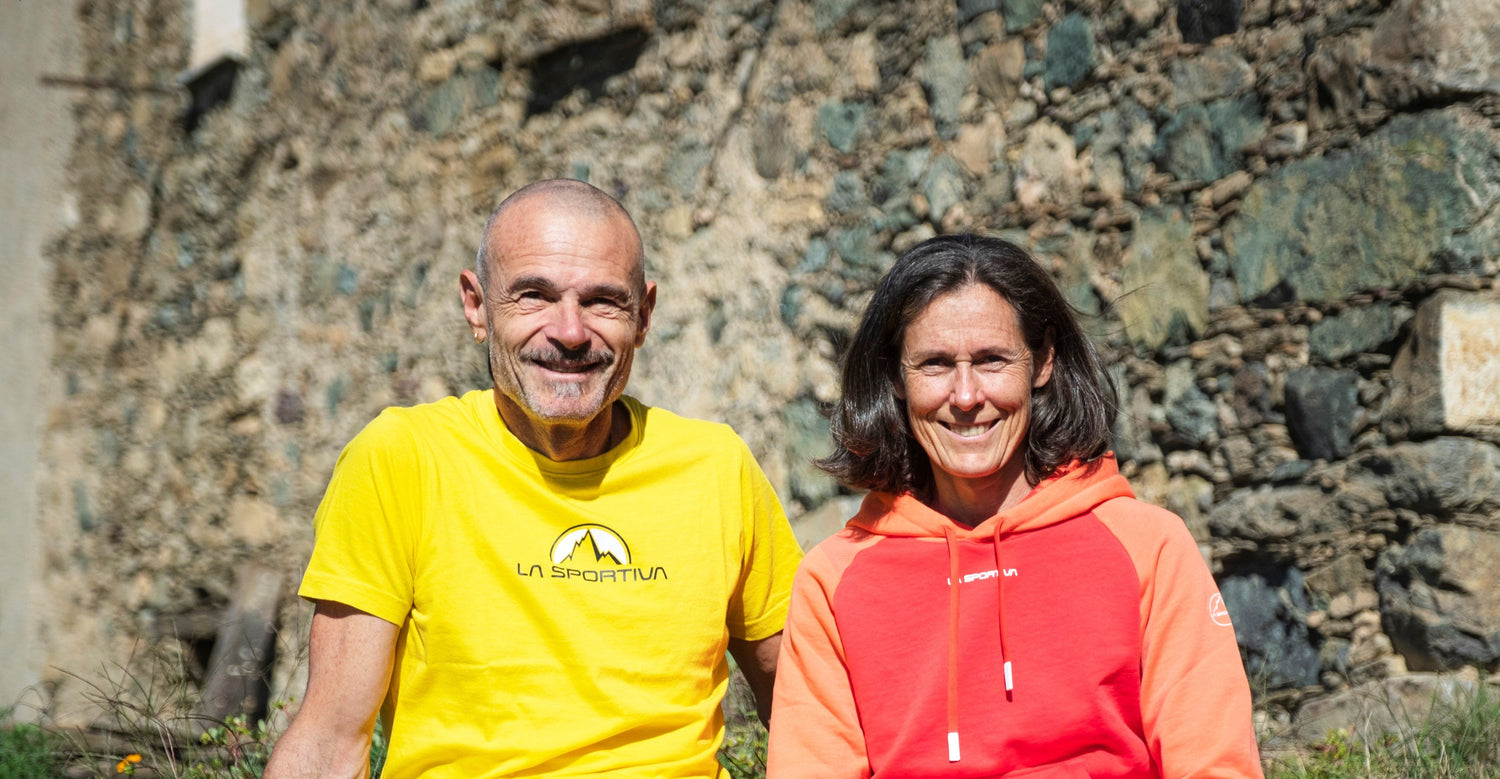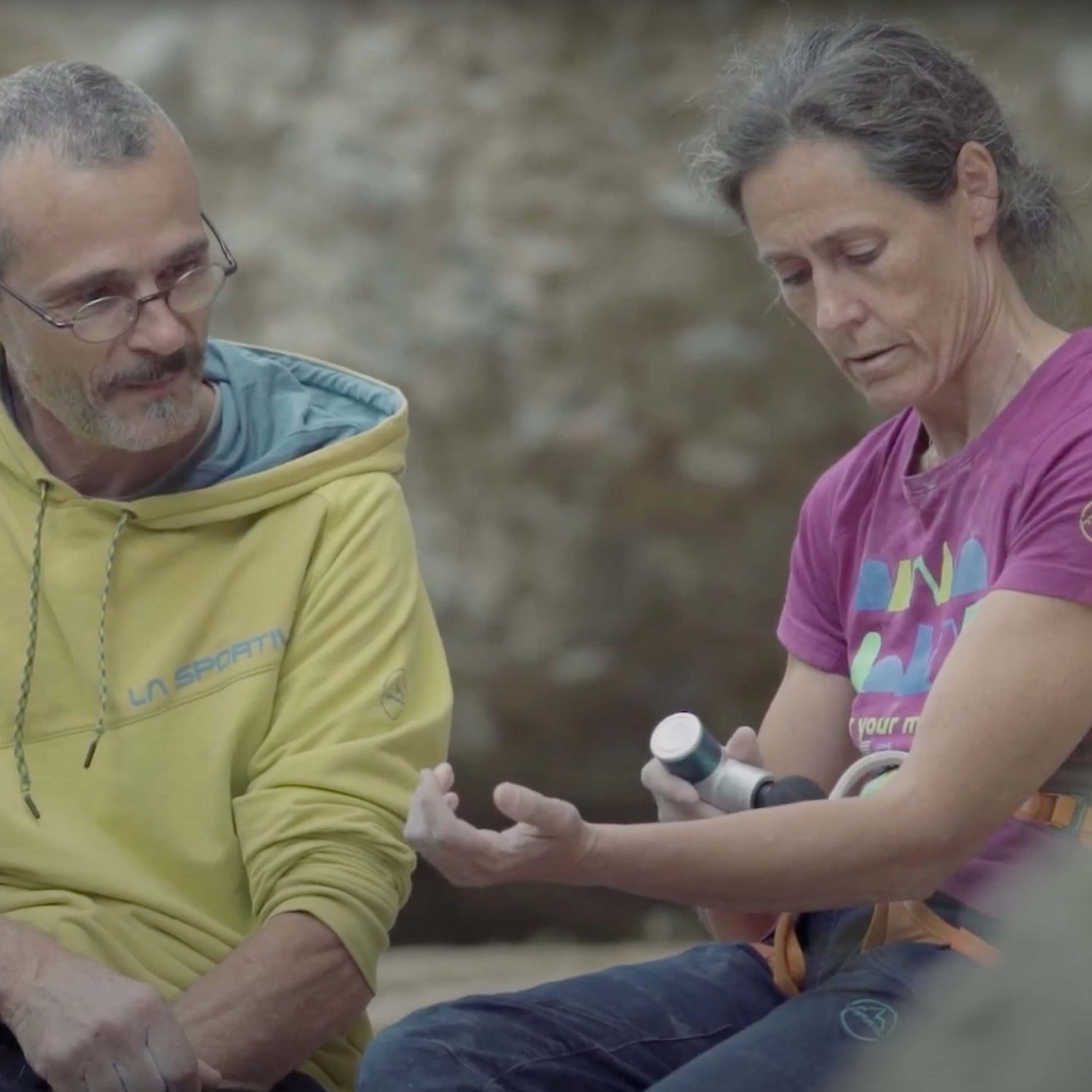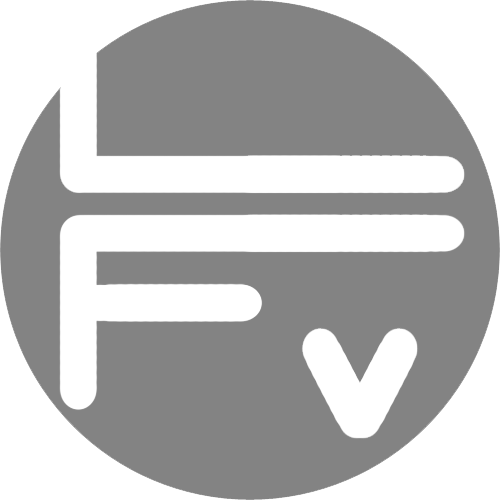

La Fabrique Verticale
La Fabrique Verticale - Presentation
Olivier Broussouloux and Laurence Guyon are the central figures behind La Fabrique Verticale, which they co-founded almost ten years ago.
Olivier, a lecturer in sports physiology at the University of Corsica, is also a certified climber and skier, and brings to LFV a rigorous scientific and pedagogical approach.
Laurence, meanwhile, is a former top-level competitor (world vice-champion in 1995, winner of the Masters d'Arco and Serre Chevalier in the same year) and a long-time editor-in-chief of a climbing magazine.
Together, they pool their knowledge and passion to offer climbers demanding, structured and caring content.

From passion to performance
Their approach to coaching, whether face-to-face or distance, is distinguished by a fine-tuned adaptation to individual profiles: they take into account not only physical capacities, but also life context, mood, personal constraints and overall progress.
As a result, they are able to support passionate climbers who simply want to improve their skills, as well as top-level athletes.
Their coaches include Delphine Chenevier, who credits Olivier and Laurence with her recent 8c performance. But also Solène Piret, five-time World Champion in paraclimbing, Mathieu Maynadier, renowned mountaineer or Siebe Vanhee, currently one of the best bigwall climbers.
Their vocation? To make climbing a space for self-fulfilment: "living your sport better" is not just about climbing hard, but building a relationship with movement, progression and sustainability over time.

Climbing as seen by La Fabrique Verticale :
Can you introduce yourself?
Olivier: "I'm Olivier Broussouloux. I'm 58 years old. I have a doctorate in exercise physiology and am currently a lecturer in STAPS at the Università di Corsica. I'm also an alpine skiing and climbing instructor.
Laurence: "My name is Laurence Guyon. I've been climbing for forty years, and I'm still as passionate about it as ever! In my first life, I was a top-level competitor (World Vice-Champion in difficulty climbing in 1995 and winner of two prestigious Masters the same year, the Serre Chevalier Internationals and the Arco Masters). After that, Olivier and I turned our attention to rock climbing, and since 1998, the two of us have completed some 1,000 routes of between 8a and 8c+, which is no mean feat!

How did your passion for climbing come about?
Olivier: "I started out as a skier. In fact, I started skiing as soon as I could walk. Climbing came later: at UEREPS Grenoble (the forerunner of STAPS), during an internship. The incubation period wasn't very long. With my then ski/climbing buddy Guy, we started skipping slalom training in Lans-en-Vercors to go climbing on the cliffs below, with knee-deep snow for the belayer.
And then there were all the optional rock-climbers we were mixing with at the time, after physical training. I discovered bouldering on the first (now mythical) section of the Belledonne hall. After that, I mainly focused on cliff climbing, with a few forays into competition (a few World Cup Opens).
Laurence: "I started climbing in 1983, in Chamonix, where my parents liked to spend their vacations. I started out as a mountaineer, then took up sport climbing in all its forms (cliff and bouldering). With my brother Philippe, 7 years older than me, we climbed just about everywhere, whenever the opportunity arose, whether in the Mont-Blanc Massif in summer or in Fontainebleau in winter, when he was working as an engineer in Paris. Or we'd move south to do some cliff climbing. I immediately fell in love with climbing, and it wasn't long before I started practicing regularly on the wall during my studies. I made a lot of progress then and it was this that led to my first podium finish in an international competition in 1992, the bronze medal at the European Difficulty Championships. But even then, it was mainly outdoor climbing that appealed to me.
After different careers in climbing, you both turned to coaching. Why did you choose this path? How long have you been coaching?
Olivier: "It was really the attraction of training (for myself or for others) that guided my choices. I started coaching in 1986, when I was still studying. It was then in the ski world, where I worked with youngsters up to national level. A few years later, having progressed in climbing and acquired a thorough knowledge of the sport, I started coaching climbers around me in the Auvergne region (Stéphane Julien, Julien Méral and Géraud Fanguin). Later, climbing coaching became a 4-handed practice: Laurence had developed a self-taught theoretical but also empirical knowledge of training principles, which had taken her to the highest world level. We put all this together to help friends around us who were preparing for the guide probationary exam, the BE climbing diploma, or for competitions.
Then, when we created La Fabrique Verticale, we quickly received requests for a particular form of training, distance coaching.
It was a new challenge for us. We had to build new tools and design an original system to optimize the trainer-trainee relationship.
How do you tailor programs to individual needs?
Olivier: "The needs of the climbers we train are very varied, as are their levels of practice. Some are recent enthusiasts, others long-time climbers with a wealth of experience. Some practice only on plastic, indoors, with no other objective than to progress in bouldering colors. Others aim for their first 9a or win competitions at national or international level. Examples include Lison Bernuz and Solenne Piret.
In practice, we take into account all the factors that can influence training capacity. And this goes far beyond mere physical ability. The family and professional environment, as well as an appetite for one form of training rather than another, must absolutely be taken into account, along with general well-being, mood and daily fitness... To do this, we have both objective and subjective tools at our disposal, which we collect on a daily basis.
What would be THE piece of advice you'd give to climbers aspiring to achieve a high level of performance?
Olivier: "I'd give three: Confidence, consistency, patience!"
Laurence: "Progressiveness too! We sometimes see climbers who start out all fired up and then burn through the stages. They end up injuring themselves and losing motivation. Another good way of progressing is not to specialize too early, but to cover all facets of the activity (both route and bouldering, and in many different styles). Finally, maintaining a good balance between physical preparation and climbing proper is also a good approach."


As well as being a coach, you launched lafabriqueverticale.com, a digital bible for the climbing world. What inspired you to embark on this adventure?
Laurence: "Olivier and I co-founded La Fabrique Verticale almost 10 years ago. We had already written several books together on climbing training (including Escalade et performance, published by Amphora, which was a real best seller in France). Olivier teaches at university, specializing in the physiology of muscular exercise. I had the experience of top-level sport that I wanted to share, as well as knowledge of the world of the press since I had been editor-in-chief of a climbing magazine for almost 10 years, EscaladeMag, which gave us a better idea of what we wanted to offer editorially. And so La Fabrique Verte was born.
It was only natural for us to create a digital media outlet to share our knowledge as widely as possible, and thus work towards a form of acculturation, bearing in mind that in a very short space of time, climbing has gone from being a confidential sport to a trendy one, with its entry into the Olympic Games and the opening of numerous climbing gyms all over France and the world. And so there are many people who have discovered this activity very recently, and who don't have a very extensive climbing culture, as we can have after 40 years of practice! They're looking for all kinds of information on equipment, history, how to train, safety... The information they find on the web is sometimes patchy, even fanciful. The idea behind La Fabrique Verticale was to provide quality content. To guide climbers and offer a 360° vision of climbing, embracing all facets of the activity and not just the narrow prism of indoor climbing. That's why we're reaching out to long-time climbers and newcomers alike, with a media that now has a very 'core' image."
And on top of that, you are the authors of best-selling books on climbing training! What impact did you hope these books would have on the climbing community?
Olivier: "We didn't expect anything! When we submitted theEscalade et Performance project to Renaud Dubois, director of Editions Amphora, our only wish was to share our experience and knowledge with other climbers. That wasn't so long ago. But then, the medium of reference for this was the book. It was a shock to see the impact it had. And beyond the number of copies sold, it's all the exchanges with other climbers, at the foot of cliffs or walls, that this book has sparked off that we remember."
Laurence: "In fact, at the outset, we simply wanted to share our climbing knowledge and experience, since we had quite a background! Long-time climbers, falaisistes, competition openers and ex-competitors ourselves, coaches, BE and trainer in Olivier's case... When Escalade et performance was published by Amphora in 2003, it quickly became a reference for those wanting to train and progress. To tell the truth, we weren't expecting it to be so well received, but we were delighted because we'd wanted it to be very comprehensive, particularly from a theoretical point of view."
Why 3 books? How do they complement each other?
La Fabrique Verticale: "In fact, chronologically, we've written 3 books on climbing or training: first Escalade et performance, in 2003, published by Amphora; then Escalade en salle, in 2017, published by Glenat; and finally Escalade à bloc, in 2019, published by Amphora. These books take a completely different approach. The first is a sum of knowledge at a given moment, it's very complete, and we've thought of it as a real bible. The second, on the other hand, is designed for new practitioners, and deals more with the first steps in the activity. They are really two completely separate niches.
As for Escalade à bloc, it was commissioned by our publisher Amphora, who wanted a book that would be easier for climbers to use, less theoretical than Escalade et performance, and easier to digest! That's why we've designed it in the form of fact sheets, tackling specific themes and proposing lots of exercises and practical situations. It's also in line with the highly pedagogical approach we take with La Fabrique Verte.
You seem to be very interested in supporting climbers in their training (coaching, a website, books) . Why is that?
Laurence: "Yes, indeed, we're in a spirit of sharing and passing on. No doubt because, when we started out, there were people who passed on their passion and knowledge to us and helped us progress. In a way, it's a way of giving back to the climbing world for all it has done for us! For my part, what delights me most in this story is to have been able to pass on my passion by becoming a journalist, the profession I dreamed of as a child. First at EscaladeMag, then at La Fabrique Verte. I'm also a regular contributor to Sport&Vie magazine. I've thus been able to combine my knowledge of the climbing world with my taste for writing, while continuing to climb! And the coaching side of things, which has grown steadily on La Fabrique Verte over the last few years, also brings me a lot, especially from a human point of view.
What's exciting and makes the work very stimulating is that we work with both top-level climbers (such as Solenne Piret, who has won the World Paraclimbing Championships 4 times) and more modest, passionate climbers who simply call on us to improve their skills. In the case of high-level climbers, the alchemy is complex, to lead the athlete to the highest performance. In the case of lesser-titled climbers, the stakes may seem lower, but in reality, there's a lot of organization and anticipation involved in keeping up with the individual. Many of our clients have a job with corporate responsibilities and a very busy professional agenda, sometimes involving travel abroad. Managing to fit climbing into this tight schedule can be a real challenge.
What does YY Vertical 's phrase "better living your sport" mean to you?
La Fabrique Verticale" is a slogan that reflects the DNA of the YY Vertical brand. Since it offers products adapted to all climbers, whatever their level and desires, with particular attention paid to ergonomics and injury prevention. In a sense, YY Vertical makes climbers' lives easier by offering them well-thought-out accessories for all areas of practice, from warm-up to training, climbing or recovery."


What is your best memory of a moment that marked you as a climber?
Olivier: "Generally speaking, discovering a new cliff is always a special moment. But the most vivid memories are the crosses Laurence and I did as a 2-person couple. In other words, routes that we both successfully completed, after sharing the entire work process. And as the icing on the cake, the ones we did on the same day!
Laurence: "Yes, it's true that the routes we worked on together and achieved on the same day leave me with a very special memory of accomplishment. I'm thinking in particular of Lourdes, Montserrat, an incredible 8b on a 60m mega pillar. We had done a scouting climb in December 2019 and we both did it during the February 2020 vacations, just before the pandemic! I'm also thinking of Nobody's perfect, an 8c in Austria, which took me longer and for which Olivier's support was unfailing."
Do you have any other hobbies apart from climbing?
Olivier: "Ski touring, especially in Corsica. And for the last 2-3 years, shooting sports (10-meter pistol), a kind of yoga for me!"
Laurence: "Reading, writing and swimming! It's the first sport I did as a child and I still love swimming, even if now I find it less fun to count tiles at the bottom of a pool than to squeeze arches."
Do you have any future projects in the climbing world (a mythical route? another book?)?
La Fabrique verticale: "If there's one thing that always drives us, it's setting up new routes. It's an unspeakable pleasure to spot, clear, equip and then follow up a project, when you've done everything from A to Z, whatever the grade of the route. To tell the truth, we're always on the lookout for the slightest piece of rock where we could put a new line, even if we don't always have the time to devote to it as much as we'd like."



